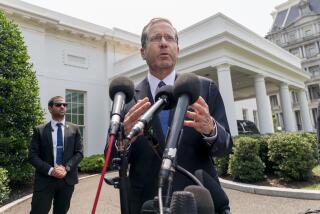U.S. Considers New Policy for Foreigners With AIDS : Immigration: People with the HIV virus would be barred from permanent residency but could visit. Such temporary stays are currently prohibited.
WASHINGTON — Foreigners infected with the AIDS virus would be permitted to visit the United States but would continue to be barred from permanent residency under a policy being considered by the Bush Administration, according to sources at the Department of Health and Human Services.
A final proposal is several weeks away, but it appears unlikely that federal health officials who sought to remove all AIDS-related restrictions on immigrants will have their way, the sources said Tuesday.
Current law forbids anyone infected with the human immunodeficiency virus from entering the country--either as tourists, on business or as permanent residents. However, the government has granted special waivers allowing AIDS-infected individuals to visit the United States under certain circumstances--to attend scientific meetings such as the annual International AIDS Conference, for example.
It was unclear exactly how the policy under consideration and current practice would differ.
In May, the Bush Administration, under pressure from conservatives and the Justice Department, abruptly reversed itself shortly before a new rule lifting all restrictions against HIV-infected foreigners was to become final. Justice Department officials had argued that the proposed changes would make the law difficult to administer fairly.
Since then, negotiations have been under way between officials at HHS and the Justice Department in a effort to reach a compromise.
One of the major concerns has been the potential economic burden that might be imposed on the health care system if AIDS-infected individuals were allowed to enter the country. AIDS is one of the most expensive diseases to treat.
But advocates of changing the rule argued that immigration law already requires those applying for a long-term visa or permanent residency to prove that they have sufficient financial resources not to become a “public charge.” Moreover, the United States allows other immigrants with financially draining conditions--such as heart disease and cancer--to enter without restrictions.
Sources said that Justice Department officials rejected several HHS proposals, including one that would have broadened the exclusion to include other high-cost illnesses in addition to AIDS, including end-stage renal disease (kidney failure), heart failure, leukemia and lymphoma.
The existing law has been attacked as discriminatory and medically unnecessary by many members of the world health community, Congress, civil rights organizations and AIDS advocacy groups.
Conservatives, on the other hand, have argued that traditional public health measures have always excluded immigrants with communicable diseases and that policy should be maintained.
The immigration issue has cast uncertainty over the location of the 1992 International AIDS Conference--the world’s premier AIDS gathering. It was scheduled to be held at Harvard University near Boston in June. But Harvard AIDS researcher Myron Essex, chairman of the conference, has said the meeting would not be held there unless all AIDS immigration restrictions were removed.
Alan Fein, executive director of the Harvard AIDS Institute, said Tuesday that until the details of the new policy became clear, Harvard would stand behind Essex’s statement.
Fein said Harvard still intends to sponsor the conference, but was exploring potential sites outside of the United States where no such AIDS restrictions exist. He said Harvard officials were expecting to announce their plans Aug. 12.
More to Read
Sign up for Essential California
The most important California stories and recommendations in your inbox every morning.
You may occasionally receive promotional content from the Los Angeles Times.










